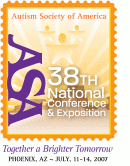 |
The ASA's 38th National Conference on Autism Spectrum Disorders (July 11-14, 2007) of ASAThe Westin Kierland Resort & Spa, Scottsdale, AZ |
| For a complete author index with session numbers, please click here | |
| Thursday, July 12, 2007: 1:15 PM-2:30 PM | |||
| Tribal A & B | |||
| #2774- In Search of the Proper Autistic Friend | |||
| For eighteen months, I observed neurotypical children at a drop-in childcare center. I learned many general rules for neurotypical social interaction, and recognized why I myself was unable to succeed socially and make friends when I was a similar age. This speech discusses the rules I learned, and I reflect on how difficult it is for autistic kids to follow these rules, since their definitions of "fun" and "friendship" are often very different. I then offer suggestions for creating an environment in which autistic children can feel comfortable around others, and can make and keep friends. | |||
| Presenter: | - James Williams is an 18-year-old individual who was diagnosed with autism at the age of 3. He began his speaking career in 1999 at the age of 11, and is now a frequent presenter at autism conferences and parent support groups. He is the co-author of THE SELF-HELP GUIDE FOR SPECIAL KIDS AND THEIR PARENTS (Jessica Kingsley, 2000), and the author of OUT TO GET JACK (Trafford, 2003), a comic novel about an autistic 11-year-old. | ||
|
| |||
|
When I was diagnosed with autism at the age of three, my mother was given several fatalistic predictions about my future life: I would never talk normally, I would never hold down a normal job or live a normal life, and I would never be a normal thinking or feeling person. Although this was understandably upsetting to her, the one thing she just couldn't accept was the prospect that I would never have friends. In fact, that seems to be the one thing that today's parents fear the most. It is a topic that I am asked about repeatedly during question-and-answer sessions after my presentations. Not only am I continually asked, "Do you have any friends?" but if I say "Yes," the next question is often: "Are they your own age?" Somehow this has become the litmus test of whether I am living a successful life. There is, of course, a scientific explanation as to why friendships are so important--human beings until very recently were unable to live alone, requiring a support system in order to survive. The success of these support systems relied heavily on cooperation and on everyone getting along. Weirdos were a liability to the group. Dr. Pamela Wolfberg, in her book "Play and Imagination of Children with Autism," cites brain research which shows that childhood friendships are important to the social development of the brain; a child who does not have friends and social interactions lacks the necessary experiences to fully develop certain centers of the brain. Yet this societal obsession with making friends is often baffling to an autistic child. More often that not, he prefers to be alone, he finds other children to be tiresome and intrusive, and he fails to understand why his parents spend so much time planning out elaborate birthday parties that make him miserable, force him to engage in playdates that are torture, then yell at him for having a bad time. "What is going on here?" he wonders. "Why can't they just leave me alone?" I, too, was baffled about all the fuss that was being made about friendships, and it was only until I got to watch neurotypical children in action that I (a) witnessed what is considered normal play and friendship, and (b) recognized why normal play is so painful or even impossible for an autistic children. So what is an appropriate, meaningful, and positive social interaction for an autistic child, and what constitutes a proper autistic friend? I found answers to these questions in an unexpected way, which I describe in my presentation. From January 2005 to June 2006, I was a volunteer at a local YMCA childcare center. A parent, usually a mom, would drop her kids off for a few hours while she swam or worked out. During this time, I saw raw play in action. I learned how girls interact, how boys hang out together, and how kids behave generally in an unstructured situation. In my presentation, I will describe four events that I witnessed or participated in at the center, and I will explain what rule of social interaction I gleaned from each event. Then I will discuss how I, as an autistic child, would have been baffled or horrified by these events, or how I would have misperceived the situation and acted inappropriately based on my misperception. In fact, when I was a kid, my mother would drop me off at the very same childcare center, and she would generally find me hiding under the plastic toddler slide upon her return. However, autistic kids can have meaningful social encounters. They can make true and lasting friends. Initially, they require someone who can make simple adjustments to the needs of the autistic person, while nevertheless enjoying the autistic person's company. It is through that enjoyment and social success that the autistic person becomes motivated, in turn, to adjust himself and his own needs to his friend. Through this process, the autistic person can experience the intrinsic give-and-receive nature of friendship and all the joys that come with it. |
|||
See more of General Submissions
See more of The ASA's 38th National Conference on Autism Spectrum Disorders (July 11-14, 2007)